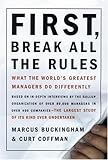The latest book on my reading list is Marcus Buckingham and Curt Coffman’s 1999 best-seller “First, Break all the Rules”. This book examines the practices and methods that effective managers use, and how these practices differ from the methodologies implemented by mediocre managers.
Good analysis starts with a mountainous sample space of data – in this case two enormous research studies undertaken by the Gallup Organization over twenty five years, surveying over a million employees from broad demographics and industries. The central aim of this research was to determine what factors motivate and retain talented employees. The somewhat surprising results suggest that although remuneration, excellent working conditions, and responsibility play their part, the employee experience of their working life is most heavily influenced by their relationship with their direct manager.
Perhaps more surprisingly is the difference in attitude between the exceptional managers (those whose charges out-perform the other employees, stay longer in their respective companies, and have more successful careers overall) and the average managers. The essence of this difference is that an exceptional manager does not attempt to focus on adding talents that an employee doesn’t possess through extra training in weak areas, rather they focus on their innate skills – drawing them out and manoeuvring the employee into a role where these strengths are maximised.
In terms of practical tools offered, the book provides examples of the survey questions asked and substantial analysis to allow you to interpret the results provided by your subordinates. Some of these questions provide enlightenment on areas directly related to the relationship with their manager, and others relating to the work environment, career prospects, and role itself.
One interesting point I took away from the book was that the amount of time an employee stays in a company is tightly coupled with their relationship with their immediate supervisor. An interesting role, company perks, and all the share options in the world won’t keep you in a job if your direct manager isn’t someone you can see eye-to-eye with.
Overall, definitely a recommendation. It remained interesting and for the most part very practical; my one criticism was that some of the examples used to emphasise the points were a little convoluted, but it wasn’t something which detracted from the information presented.
